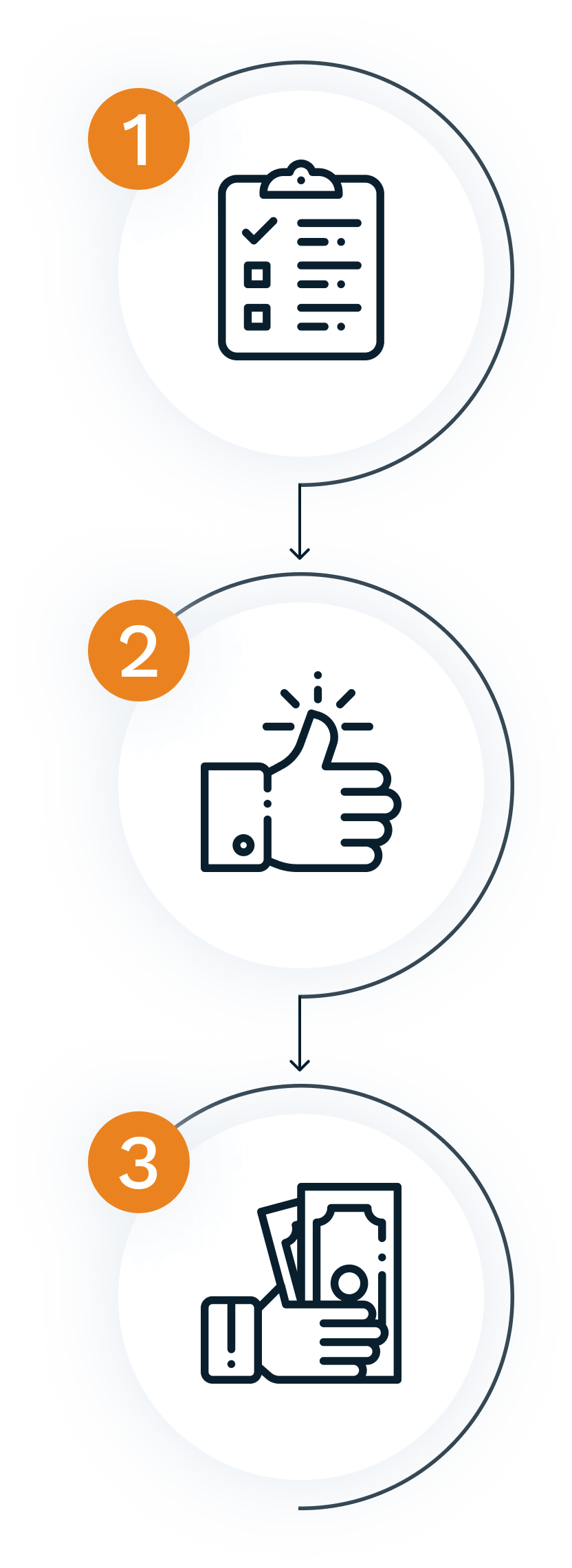Factoring
Financial instrument that is not just saving and expanding the customer base, but also preserving working capital
«AA Factoring»
Save time - multiply money.
Factoring is a catalyst for your business
Factoring is a catalyst for your business
A few facts about us
Experience in factoring
> 15
years
years
New opportunities for your business
Digital factoring
Approved
applications
applications
10 000+
Service standards
High
The speed of decision-making
30 minutes
The rate
0.5%
Assist your business

Factoring is an effective financial instrument that allows:
Develop business by accelerating cash turnover
Optimally manage working capital
Save time and efforts on resolving disputes with partners
Optimally manage working capital
Save time and efforts on resolving disputes with partners
If an enterprise has to work with deferred payments, the pause between the shipment of products or the provision of services (execution of work) and the receipt of money negatively affects the dynamics of the business. The factoring company, acting as a financial partner, pays the money immediately after the transaction is completed. It also assumes not only the functionality for managing accounts receivable and organizing factoring services, but also hedges the financial risks of non-payment on the part of Buyers (Debtors).
The product that fits your business
There is a wide range of tools for different business areas in the "AA Factoring" line of financial services. We are ready to offer flexible individual conditions for each client, depending on the specifics of any company.

Financing of State Contracts
Work within the framework of the Federal Law on Public Procurement? Need money to replenish working capital? Factoring allows you to receive money under the executed contract with deferred payment.

Purchase financing or agency factoring
This is an opportunity to get factoring financing for the purchase of goods at the right time as well as make payments on the issued invoices timely.

The advantage of this product is its low cost, which can be compared with a loan, because the Client assumes the right to pay under the contract.
Recourse
factoring
factoring
Non recourse factoring
A classic product that meets "sold and forgotten" principle. The factoring company is responsible for managing accounts receivable and assumes the risk of non-payment.


Digital factoring
A type of factoring that transits to ED tools and involves no printouts
Administrative management of receivables
A non-funding service that allows Clients to outsource financial management functions
Private
factoring
factoring
A type of recourse factoring that does not involve notification of the Buyers of the fact that the Client has ceded monetary claims to the Factoring Company.
Just 3 steps for the money
to be in your account
to be in your account

Step 1. Fill the application
Send the documents necessary for making a decision to conclude a factoring agreement.
Step 2. Receive the decision
Your application will be reviewed within 30 minutes and you will be contacted to inform of the decision.
Step 3. Get the money
Sign the factoring agreement on mutually beneficial terms and receive payment immediately after the delivery of products or services (execution of work)
Get funding right now

"AA Factoring" provides transparent and secure interaction of all participants of the factoring transactions.
Do business, not seeking for finance!
Do business, not seeking for finance!
Our partners
Universal Bank founded in 1995. Included in the top-10 of largest banks in Russia and in the list of systemically valuable credit institutions approved by the Central Bank.
Promsvayzbank
Professional solution for counterparty verification, credit and tax risk management, marketing, investment analysis and affiliation search.
SPARK INTERFAKS
Professional participant in the audit, appraisal and consulting services market. Member of the Forum of Firms Association, which unites the largest international audit networks.
FinEkspertiza
State Development Corporation. Its main task is to contribute to the long–term Russian economy development. In partnership with commercial banks, VEB is engaged in financing large-scale projects aimed at developing infrastructure, industry, social sphere, strengthening technological potential and improving the quality of people's lives.
VEB.RF
FAQ
Factoring is a multifunctional complex of financial services and digital technologies for the Suppliers and Buyers business that work on deferred payment terms, providing for the assignment of a monetary claim.
Services include:
- financing
- hedging the risk of late payments or non-payment by Buyers
- administrative management of accounts receivable
- financial management
- conducting a comprehensive business analysis of counterparties transferred to factoring services
Services include:
- financing
- hedging the risk of late payments or non-payment by Buyers
- administrative management of accounts receivable
- financial management
- conducting a comprehensive business analysis of counterparties transferred to factoring services
For the Supplier:
- gain additional financial leverage by increasing capital turnover
- reduce the risk of a cash gap
- tinsure the risk of non-payment
- get an unsecured financial instrument
- predict financial flows
- improve the balance structure
- expand the customer base
For the Buyer:
- pay off your Supplier without using working capital
- receive or increase a deferred payment from your Supplier
- get guarantees of the Supplier's fulfillment of obligations under contracts
- get financial support without changing the balance sheet structure
- expand the customer base
- gain additional financial leverage by increasing capital turnover
- reduce the risk of a cash gap
- tinsure the risk of non-payment
- get an unsecured financial instrument
- predict financial flows
- improve the balance structure
- expand the customer base
For the Buyer:
- pay off your Supplier without using working capital
- receive or increase a deferred payment from your Supplier
- get guarantees of the Supplier's fulfillment of obligations under contracts
- get financial support without changing the balance sheet structure
- expand the customer base
Recourse factoring
As part of this product, the supply is financed with services for the administration of payments, as well as the management of receivables. In this case, the risk of non-payment for the delivery of goods or services rendered to the factoring company is borne by the Supplier
Non-recourse factoring
The factoring company insures the Supplier against the risk of non-payment by the Buyer
Purchase financing or agency factoring
This product is more focused on the Buyer, as it finances Suppliers in which the Buyer is interested. This type of factoring allows you to receive a financial instrument without increasing the credit burden.
Pre-delivery factoring
The Supplier receives financing against the future assignment of monetary claims against its Buyers
Financing of government contracts
A type of factoring service focused on the state order market (Russian federal laws 223-FZ, 44-FZ)
Digital factoring
A new direction in the factoring market, focused on the digitalization of the factoring service business processes and reduction of the time to receive financing
Accounts receivable administration
A product without providing financing. It allows Clients to hand over Buyers' receivables to management and ensure the proper quality of payment discipline
Private factoring
A type of recourse factoring that does not involve notification of the Buyers of the fact of the assignment of monetary claims by the Client to the Factoring Company
International factoring
Financing of export or import contracts.
As part of this product, the supply is financed with services for the administration of payments, as well as the management of receivables. In this case, the risk of non-payment for the delivery of goods or services rendered to the factoring company is borne by the Supplier
Non-recourse factoring
The factoring company insures the Supplier against the risk of non-payment by the Buyer
Purchase financing or agency factoring
This product is more focused on the Buyer, as it finances Suppliers in which the Buyer is interested. This type of factoring allows you to receive a financial instrument without increasing the credit burden.
Pre-delivery factoring
The Supplier receives financing against the future assignment of monetary claims against its Buyers
Financing of government contracts
A type of factoring service focused on the state order market (Russian federal laws 223-FZ, 44-FZ)
Digital factoring
A new direction in the factoring market, focused on the digitalization of the factoring service business processes and reduction of the time to receive financing
Accounts receivable administration
A product without providing financing. It allows Clients to hand over Buyers' receivables to management and ensure the proper quality of payment discipline
Private factoring
A type of recourse factoring that does not involve notification of the Buyers of the fact of the assignment of monetary claims by the Client to the Factoring Company
International factoring
Financing of export or import contracts.
Urgency:
factoring is an indefinite financing, as the money that the factoring company pays remains in the company's turnover; a loan is a fixed-term instrument.
Repayment process:
The loan is repaid with the company's own funds, taken from money circulation, while factoring doesn't have such problem, since the debt on monetary claims is repaid from funds received from Buyers.
No collateral:
When using a loan there is always a deposit with a limited capacity plus the deposit is always discounted. Factoring does not set collateral for financing.
Level of risk:
Factoring without the right of recourse completely frees the Client from the risk of non-payments of the Buyer. The risk passes to the factoring company.
Targeted use:
Received financing can be spent without control of the targeted use of funds by the factoring company.
Flexibility:
The funding limit for factoring can be increased as sales volumes increase.
Reflected in the balance sheet structure:
Factoring is not reflected in the balance sheet structure as a credit obligation.
The method of the commission payment :
For a loan the commission is paid using the working capital of the company. For factoring the commission can be paid from the 2nd payment upon receipt of funds from the Buyer, or it can be offset from the amount of paid financing
There are no defined limits:
In most cases, the factoring limit is set on the Debtor and utilzed by the Client as the need arises.
Factoring is loyal to the representatives of SMEs:
Almost any company can use this financial instrument, since the risk is mainly assumed by the Buyer, who, as a rule, has a higher credit rating than the Supplier.
factoring is an indefinite financing, as the money that the factoring company pays remains in the company's turnover; a loan is a fixed-term instrument.
Repayment process:
The loan is repaid with the company's own funds, taken from money circulation, while factoring doesn't have such problem, since the debt on monetary claims is repaid from funds received from Buyers.
No collateral:
When using a loan there is always a deposit with a limited capacity plus the deposit is always discounted. Factoring does not set collateral for financing.
Level of risk:
Factoring without the right of recourse completely frees the Client from the risk of non-payments of the Buyer. The risk passes to the factoring company.
Targeted use:
Received financing can be spent without control of the targeted use of funds by the factoring company.
Flexibility:
The funding limit for factoring can be increased as sales volumes increase.
Reflected in the balance sheet structure:
Factoring is not reflected in the balance sheet structure as a credit obligation.
The method of the commission payment :
For a loan the commission is paid using the working capital of the company. For factoring the commission can be paid from the 2nd payment upon receipt of funds from the Buyer, or it can be offset from the amount of paid financing
There are no defined limits:
In most cases, the factoring limit is set on the Debtor and utilzed by the Client as the need arises.
Factoring is loyal to the representatives of SMEs:
Almost any company can use this financial instrument, since the risk is mainly assumed by the Buyer, who, as a rule, has a higher credit rating than the Supplier.
The Buyer does not bear additional financial responsibility for factoring, that is, when the monetary claim is assigned, the payment amount does not change and there are no significant changes in the relationship between the Buyer and the Suppliers. All contractual relations between the Supplier and the Buyer and the practice of their cooperation remain unchanged. The buyer pays under supply contracts at the same time as before, but only to the account details of the factoring company, as for the notice.
Contacts


+007 (495) 308-7780
info@aafactor.ru
info@aafactor.ru
119435, Moscow, Pirogovskaya str. 13, build. 1
Have questions?
Address
Leave you contacts so we can reach you
By pressing the button you agree with our Privacy Policy
Leave your contacts to get detailed information
By pressing the button you agree with our Privacy Policy





